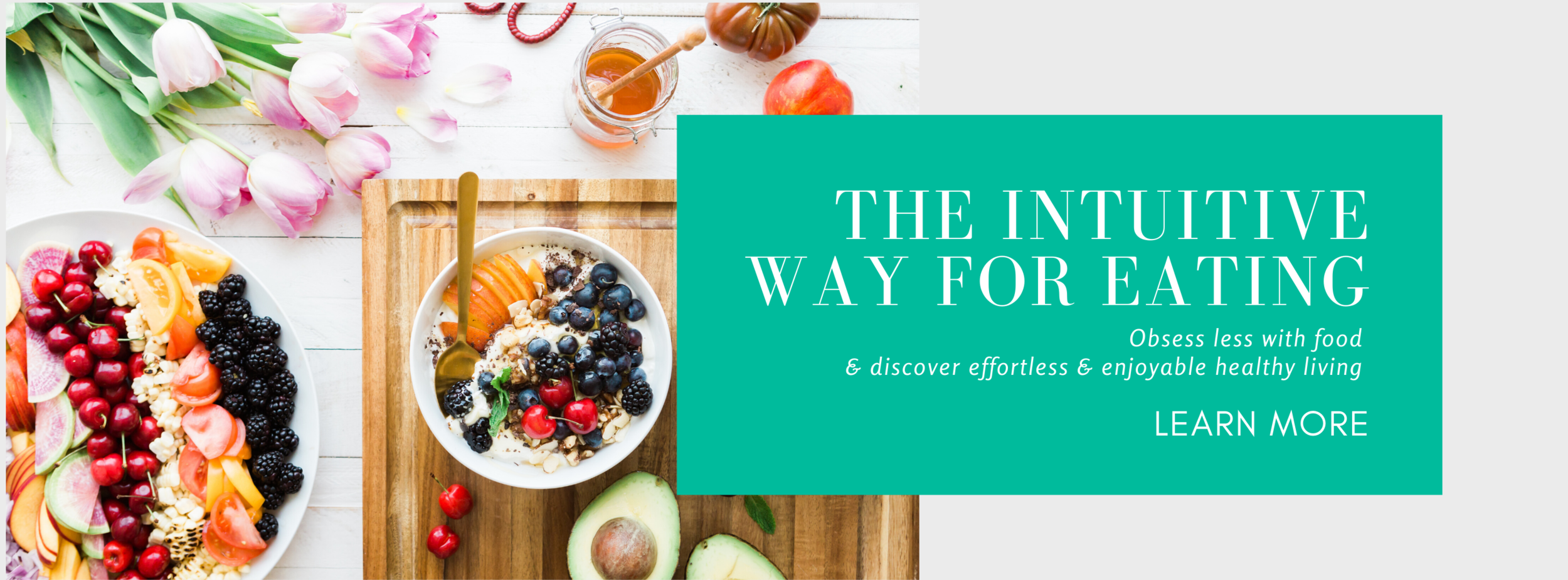Intuitive Eating For Beginners
Intuitive Eating might sound like a new concept to some, but actually, every individual starts their life as an Intuitive Eater. It's the influence of society and what we're taught about food that causes us to stray from the act of trusting our bodies.
If you've been stuck in the cycle of chronic dieting for years on end, Intuitive Eating might be a new concept for you.
The act of Intuitive Eating suggests that becoming more in tune with the body's innate needs and hunger signals is a more effective way to manage weight and support your overall health, with the goal of carving out a healthy relationship with food. It means giving yourself unconditional permission to eat what you desire without guilt or punishment, but while still honouring your needs. It means to eat for physical reasons rather than emotional reasons and relying on hunger or satiety cues to determine when and how much to eat.
When we're stuck in the diet cycle, we actually become really good at ignoring our body's signals and find ways to wrong them. You've probably seen quick tricks and gimmicks in magazines that recommend you to chew gum, drink a diet pop or chug a litre of water to stave off the sensation of hunger. But hunger isn't a bad thing! It's your body's way of telling you it needs fuel. Plain and simple!
Because health is very moralized in society today (i.e. if you aren't pursuing a "healthy life", people might ask what's wrong with you), we end up honouring the expectations society has of us more than our own innate needs. We're taught that we cannot trust our body and that doing so will lead to being out of control. As a result, we trust the recommendations of other health professionals and health-centric media outlets more than we trust ourselves. Even as a health professional myself, I see this as a flaw and one of the biggest reasons people are so confused about health and what to eat, which has ended up in many distorted relationships with food, the need to diet which often leads to binging.
But here's the thing: our bodies innately know how to nourish themselves and will give us signals through various cravings and hunger pangs.
Some days, you might be all about a kale salad, whereas the next day, nothing short of a burger will cut it. This is OKAY and is the beauty of Intuitive Eating! You'll quickly find that by honouring your needs and desires, you will feel less obsessed and fixated on a specific food as a result (usually the food that we say is "off limits").
Don't believe me? Let me let you in on a little secret! I've been practicing Intuitive Eating for just over a year, based on the recommendations in Evelyn Tribole & Elyse Resch's book, Intuitive Eating. I'll admit, at first it was scary just trusting my body and eating food without guilt or punishment. Naturally, one would fear that trusting their body to eat what they please, be it a kale salad one day or chips and a burger the next day, would lead to weight gain.
A while ago, I was at my Mom's place who happened to have a scale. I felt like I was having a mental battle with it, as I was so curious what number it would spit out for me on that day (while reminding myself that the number has nothing to do with my worth or value), but also terrified that, because I've surrendered control and trusted my body to determine all of my needs, I would have gained weight. But as the curious cat I am, I did it anyway – I stepped on the scale. To my surprise, I was down 5-8lbs from when I last weighed myself.
My point in sharing that story with you though is to not sell Intuitive Eating as another weight loss gimmick, but to show you that your body knows what it's doing. It will tell you when to eat and when you've had enough, if you simply just listen!
Benefits of Intuitive Eating
Not only does Intuitive Eating mean that you can actually enjoy foods again (because YES, so many people forbid themselves from receiving pleasure from food), but it comes with a wealth of mental and physical health benefits as well, including:
Sustained a balanced weight (for your unique genetic blueprint!)
Reduce feelings of obsession with food
Feel more satiated and content
Increased energy
Decreased stress
Lowered incidence of disordered eating and restrictive food behaviours
How To Start Eating More Intuitively
When starting out on the path towards becoming more of an Intuitive Eater, it's important to be patient with yourself. This isn't something that happens overnight and while it may come with directions or a guide, there's no right or wrong way of doing this. Even if you do happen to eat to satisfy emotional hunger, which Intuitive Eating doesn't recommend, it's okay! The point is to make a mental note of all of the times we are turning to food when we are or are not biologically hungry so we can become more aware of our eating habits and how we're using food.
If Intuitive Eating is a new concept for you, you can start by gradually incorporating the tips below:
Seek satisfaction from food
You might not believe how many people forbid themselves from receiving pleasure from food, but many of us do. Receiving pleasure from food is often perceived as being gluttonous and therefore "bad". But when we eat foods that we actually enjoy and are excited about, we feel more satiated and content as a result; preventing the desire to overeat. When you're eating, pay attention to the taste, texture, aroma, appearance, and temperature and observe which brings you the most joy!
Honour Your Appetite & Respect Your Fullness
The next time hunger strikes, honour it! We're so used to ignoring or masking our hunger pangs because we perceive hunger as being a bad thing. But the sensation of hunger is a signal from our body that it needs fuel and by ignoring it, it's only going to intensify that feeling. The same thing goes for if we're full because if you genuinely do feel full, Intuitive Eating would suggest that you stop eating at that point.
The reality is that many people continue to keep eating because they've been taught to eat everything on their plate or they can't get enough of the specific food. But if you simply allow yourself to enjoy that food more frequently, it will remove the novelty from that food and allow you to enjoy it more sparingly, because you know it will always be there for you if you want it again.
Keep a Well-Stocked Kitchen
It's difficult to eat intuitively when your fridge and cupboards are looking a little bare. The goal is to keep your kitchen stocked with a balance of healthy and "play foods" (a nicer name for "junk food") that you enjoy so you can properly honour your needs at any given moment. You might wonder why a Holistic Nutritionist like me is suggesting that you keep so-called play foods in the house (i.e. ice cream, chips, chocolate).
The reason why is because when we legalize all foods and believe that no foods are off-limits, we can actually have a healthier relationship with them. We stop obsessing over them as a result and building up an intense desire for them. I know the common rule is to keep "bad" foods out of the house, but what this does, is make you crave them more than ever and overeat the specific food when you have access to it again.
Keeping the food in the house will actually help to alleviate that and of course, ensuring that you're always honouring what makes you feel best and being honest with yourself with what does (i.e. ice-cream might make you feel good in the moment but if it leads you with a belly ache or rancid farts -- I'm raising my hand over here -- then it may not be making you feel your best!).
Differentiate Between Cravings and Physical Hunger
There's this misconception that since Intuitive Eating is all about honouring your needs, that you can eat whatever you want, including any craving that strikes. While this is true to an extent, what we have to remember is that Intuitive Eating also respects how you feel and honours physical biology (true hunger) first and foremost. So while our cravings can be telling, since they are often signs of nutritional deficiencies in the body, it doesn't mean that we should necessarily honour each one.
A good rule of thumb is to ask yourself if you would eat an apple in that moment, because the truth is, true physical hunger doesn't discriminate. It would gladly take the apple to satisfy hunger. If you wouldn't eat the apple in that moment, you are likely looking to satisfy an emotional hunger instead.
Bring Mindfulness To The Act of Eating
Slowing down the whole process of eating and practicing mindful eating really allows us to tune in; it allows us to be more receptive to how the food tastes, how it's making us feel both emotionally and physically. This means putting your food on a plate, sitting at a table (versus on-the-go), chewing 20-25X and putting your fork down in between bites. These suggestions aren't meant to bring more rules to Intuitive Eating, but to help guide you on your journey of slowing down the process and becoming more aware of how you're using food.


